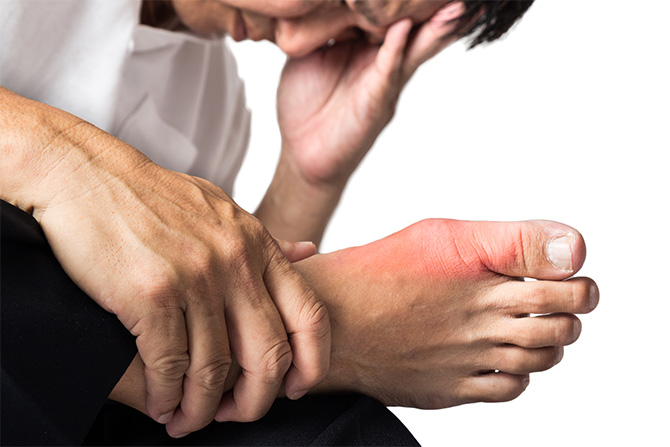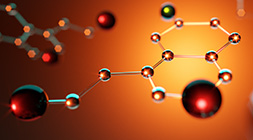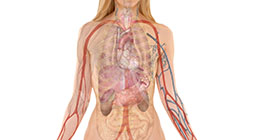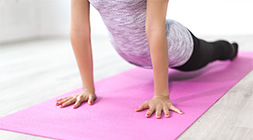
Overview
Symptoms
Causes
Prescription
Health Tips
Gout is a common type of arthritis. Its distinguishing symptom is an excruciatingly painful big toe, but it can also affect other joints. It affects mostly men—95 percent of those afflicted are male. It is thought that estrogen may help to protect women.
Gout arises when there is a buildup of uric acid in the body that crystallises in the joints. Uric acid is a by-product of protein metabolism, especially from eating foods high in purines, which include organ meats, beans, legumes, beer, and wine.
If there is too much uric acid left in the blood, it is excreted to the joints, tissues, kidneys, and tendons where it causes inflammation. Uric acid crystals act as an abrasive, inducing pain and swelling in affected areas.
Pseudogout, officially known as calcium pyrophosphate dihydrate crystal deposition (CPPD), is similar to gout except that calcium, rather than uric acid, crystallizes in the joints. The presence of these calcium crystals weakens the cartilage, inducing it to break down more easily. The body reacts by creating inflammation to rid itself of the crystals.
Symptoms
Gout comes and goes, and its duration can vary from a few days to a few weeks depending on the intensity of causal factors. Common symptoms are:
- Cartilage may become so damaged that bones rub together
- Difficulty walking and sleeping
- Fever or chills are possible
- Gnawing pain in the big toe, joints of the hand, wrist, or knee
- Redness, heat, pain, and swelling in one or more joints
Causes
Gout has a genetic component and often runs in families. The most likely causes of gout are insufficient uricase (a digestive enzyme), eating a diet high in purines (organ meats, bacon, certain fishes), and excessive alcohol consumption.
The cause of pseudogout is unknown, but it is suspected that there may be an abnormality in connective tissues or cartilage, possibly due to a genetic factor.
High blood pressure and kidney disease are often seen in those suffering with gout.
For those with gout, the following can trigger an attack:
- Chemotherapy
- Dehydration
- Excess alcohol intake
- Excess weight
- Fasting
- Foods high in purines
- Foods or drinks sweetened with high fructose corn syrup
- Some immunosuppressive and diuretic medications
- Stress
Prescription for Health
| Nutrient | Dosage | Action |
|---|---|---|
| Moducare®
(Beta-Sitosterol, Beta-Sitosterolin-Beta-D-Glucoside) |
20 mg / 0.2 mg
Adults and children 17 years and older take 1 capsules three times daily OR 2 capsules upon rising and 1 capsule before bed. Children 5 to 10 years take 1 capsule or chewable tablet, one to two times daily. |
Helps to support a healthy immune system balance |
| Vitamin C (calcium ascorbate, magnesium ascorbate and potassium ascorbate) | 500 mg three times a day | Reduces serum uric acid |
| Celadrin™ | Orally 1500 mg per day and
Topical ointment apply twice per day |
Reduces swelling, pain and improves joint mobility. Inhibits the mediators of inflammation and joint destruction. |
| Tart Cherry extract (Prunus cerasus) | 750 mg twice daily
During attacks 1500 mg twice daily |
Reduces serum uric acid |
| Quercetin | 200 to 400 mg daily | Inhibits uric acid, anti-inflammatory |
| Magnesium bisglycinate or threonate | 200 mg three times daily | Especially important for pseudo gout where calcium is up regulated. |
| Omega-3 | 2000 mg per day | Reduces inflammation, less stiffness in the joints |
| Zinc | 15 to 30 mg daily | Deficiency is common during gout attacks |
| Celery Seed extract (Apium graveolens) | 1000 mg daily | Decreases serum uric acid levels |
Health Tips to Enhance Healing
- Avoid non-steroidal anti-inflammatory drugs (NSAIDs).
- Check iron levels, especially with pseudogout. Hemochromatosis (high iron levels) is associated with pseudogout. If iron is high, consider donating blood.
- Do not take niacin as it may promote a gout attack.
- Drink pure, filtered water every day. It will help flush out uric acid. For every juice or caffeinated beverage consumed, drink another glass of water.
- Eat plenty of fresh fruits and vegetables, raw or as juices. Berries, onions, and parsley are good sources of antioxidants.
- Eating at least 1/2 lb (250 g) of dark cherries or strawberries daily can neutralize uric acid. If these fruits are out of season, cherry extract is available at health food stores; look for a sugar-free brand.
- Eliminate alcohol entirely. Beer and wine promote gout attacks.
- Eliminate organ and red meats, mushrooms, peanuts, meat-based gravies, shellfish, sardines, herring, and mackerel from the diet during an episode of gout. Once symptoms are gone, limited consumption may resume.
- Exercise. It is important for gout and pseudogout sufferers to get regular exercise, especially if overweight. Begin a moderate exercise program emphasizing the cardio component to help reduce weight, as opposed to embarking on a restrictive diet. Fasting or a sudden withdrawal of foods can increase uric acid.
- For those with gout, Vitamin A supplements are not recommended. These can create toxicity due to conversion to its more toxic retinoic acid, promoted by a dysfunction in enzymes.
- Restrict consumption of refined flour, fructose and simple sugars found in commercial bread, honey, fruit, and juices.










